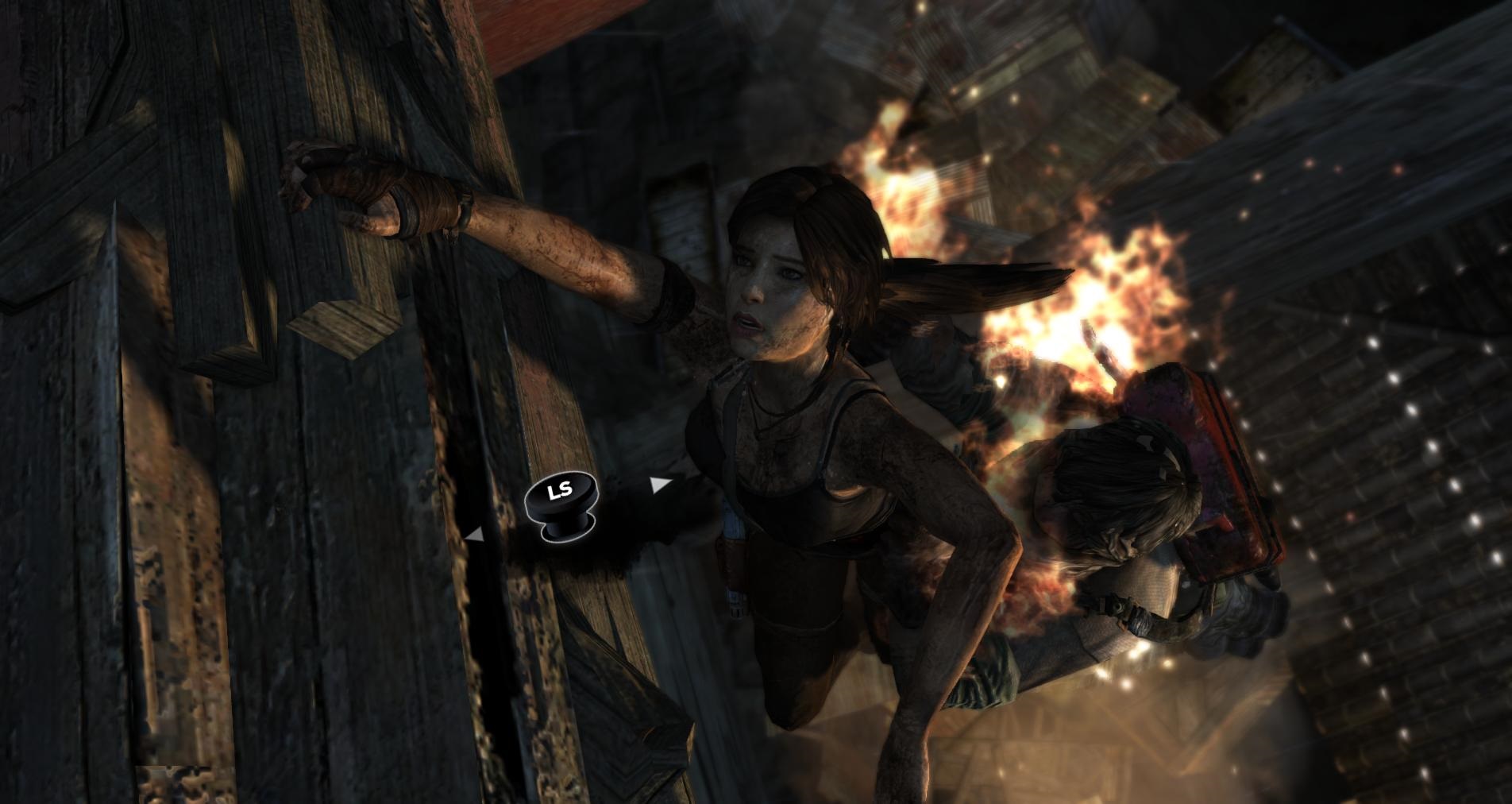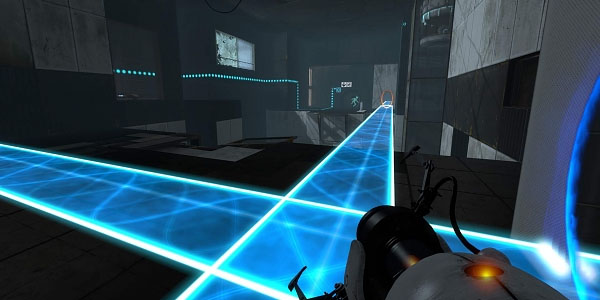Last year I saw a video featuring "Mirror's Edge-inspired parkour" and that got me thinking about that game. Time and time again, I have seen the name of Mirror's Edge pop up front and center whenever anybody talks about parkour in video games. If there's a discussion about freerunning in video games, Mirror's Edge will come up. If ever a game is modified to be more based around freerunning, that modification will often be labeled "Mirror's Edge-inspired." Parkour enthusiasts have rallied behind this game and adopted its art style as a symbol of the freerunning culture. What's the big deal? Last week I started up the game to find out.
For the uninitiated, Mirror's Edge is an action platforming game focused heavily on navigating through the world. The player character is armed only with a set of freerunning skills inspired by the acrobatic art of parkour. Instead of going down a beaten path, the player must climb to higher ground, leap across rooftops, run across walls, and generally use the urban terrain in any and every way to get from point A to point B. One aspect of the game that assists players is a mechanic called "Runner Vision," which represents the character's intuition for pathfinding. In the game, Runner Vision turns certain objects and platforms red to present a possible path or escape route. This often clashes highly with the game's normal pristine white environments and is part of the game's signature design.
The story introduces us to a dystopian city where the rich and powerful wield absolute control through coercion and surveillance. Any dissent is quickly put down. The only hope for any resistance is in a breed of athletic couriers called runners. The runners are the backbone of an information network that gives freedom fighters a chance. The player takes on the role of Faith Connors, a runner tasked with saving her sister's life and uncovering the truth of the ominous "Project Icarus."
Between chapters the story is told through more stylized animated cutscenes which have a bit of a noir feel
And let me tell you, this game is a wild ride all the way through. One moment you'll be freely leaping between rooftops. The next, you'll be running for your life from gunfire. The next, you'll find yourself indoors and needing to find your way up to an air vent. The next, chasing after a suspicious character who has information you need. Because the terrain is so important to how you progress, I can look at any set piece from this game and remember what it was like to find my way through it.
If you can't tell by now, I ended up liking the game. I'm not a parkour enthusiast myself, but watching their work and playing this game has clued me in to how they can swear by it and admit it into their culture. In fact, what I've observed researching this game rings true for many instances of video games based off of real-world cultures, hobbies, professions, etc.
First of all, Mirror's Edge is spot-on when it comes to simulating parkour with video game controls and a first-person perspective. Even if it's not perfect, you can tell a lot of effort and observation went into this game, and I think that's what really matters. There are plenty of games that feature characters that run and jump and navigate structures to get to their goals, but Mirror's Edge is one of the few first-person games that places it front and center. Barring moments when you may get stuck in a combat situation, you'll be running around and navigating terrain. In fact, the best idea when faced with enemies oftentimes is to find a route around and avoid them. You are encouraged to stay in motion and keep this about the freerunning, which is admirable.
You'll be seeing this view often as you tackle the game's many daunting jumps
It's worth mentioning that there is a rather neat combat system that incorporates your parkour skills, along with a gunplay aspect. Apparently the game's handling of guns leaves much to be desired, but I never bothered. And that's saying more about the athletic fisticuffs; I was having too much fun disarming opponents with well-timed counters and jump-kicking singled-out targets!
And that's the thing about video games which makes it exciting when there is one made based off of a real-life interest. A game can be as grounded in realism as much or as little the designers want it to be. Just because a game is realistic in some ways doesn't mean it can't be exaggerated in other ways for the sake of an enjoyable playing experience. In Mirror's Edge, failing a jump can cause you damage or kill you. If you take a jump slowly or from the wrong angle, it will take you more time to recover from it. If you approach the jump at the right angle while running at top speed, you can leap over obstacles and pull yourself up to higher ground faster. Those make sense because you're able to build up momentum and from a game standpoint you're rewarded for moving efficiently. Meanwhile, Faith always has perfect balance, never fails a saving roll after a high jump, and is generally never subjected to little unavoidable human errors that often lead to injury. Case in point, someone I know is learning parkour and he once hit his head on the ground practicing a standard rolling procedure. Faith will never do that. When you tell her to roll, she rolls and that's that.
The point I'm getting at is how there is some element of homage whenever a real-world interest inspires the mechanics of a video game. I can imagine there's something flattering to parkour enthusiasts about a video game in which the player saves the day with "the power of parkour," so to speak. Faith's freerunning skills are an exaggeration of real-life capabilities to present a flattering and entertaining image of parkour that can be enjoyed by everyone, enthusiast or non.
Here is the video that inspired this discussion. I believe the performer is intentionally emulating the feel of the game, which is really cool
In addition, by appearing as the protagonist and player character of this game, Faith has established herself as an icon of sorts. When a video game studio got the idea to make a game with parkour as a central mechanic, this character was created. Her being fictionalized and designed to represent an art serves to make her easier to rally around. Her look, her attire, her affinity for colors, became synonymous with her and the culture she was made to represent. There's some back and forth homage and inspiration at work. As a result of this character's creation and use in the game, parkour practitioners who are fans of the game seem to enjoy adopting those traits. For instance the runner symbol, the color motif of crimson against pristine white, and Faith's attire. I know of at least one video where Faith's signature red glove is prominent.
Having a real-life interest given the "video game treatment" can be an exciting thing. It represents the interest in new ways that can generate more interest from unlikely sources. The video game can then be used as a bridge between long-time practitioners and people who became curious because of the video game. On the other end, the interests represented can return the excitement back by representing the game in their real life practices. They can rally behind a common icon, that being the game, game world, or significant characters. There are a great many games that have been inspired by real world practices and had potential to enhance both. I'll quickly list a few others that may not be on the level of Mirror's Edge, but still show the creativity of video games as a medium.
One early example of video games taking inspiration from real life: Punch-Out!! for the Nintendo Entertainment System. This game plays more like an action puzzle game than it does a fully robust boxing simulator. The game misses out of the little nuances of boxing strategy that I cannot begin to comprehend in favor of reaction-based gameplay and pattern memorization. In the end, we still have a go-to video game for fictionalized and exaggerated boxing and all the fun that goes with it. I recall that the Wii installment in the series was met with great enthusiasm by a YouTube video creator who was big into boxing. The protagonist, the Rocky-inspired Little Mac, has come into his own as a boxing representative that gaming can call its own. And if these games have provoked any solitary individual into looking at real boxing, that aspect has also been fulfilled.
Ace Attorney is not a close law simulator, but it is a celebration of logic and situational awareness
Another noteworthy example: The Ace Attorney series known mostly for its protagonist Phoenix Wright. Ace Attorney hardly represents the legal process. In fact, it's more of a melodramatic detective series that boils down to proving clients' innocence in murder trials. But the characters, design, and stories are all their own while still inspired by the legal system. While we won't see Phoenix design contracts, settle out of court, or brush up on changes in law, one basic and key element is still represented: Logic. Phoenix still uses logic and his knowledge of the situation to reach conclusions which are both favorable and feasible. Though logic and the ability to see the bigger picture are small parts of being a lawyer, they're still vital, and Ace Attorney hits that note. At least I'd hope so. I haven't studied law, so I'm at the mercy of actual practitioners.
Confession time: I genuinely was a little bit obsessed with farming after first playing a Harvest Moon game
Last on my abridged list: Harvest Moon. Who would have thought a game about farming would be so popular and spawn a series that is still ongoing in more than one line of games? Clearly the designers, who started with the concept of a farming game and made it into a money-making game fueled by consistent small tasks. The amount of time it takes to grow crops and mature livestock is exaggeratedly quick, but the principles of day-to-day hard work are well represented. I'm not so sure Harvest Moon will make many farmers out of gamers, but teaching the work ethic of farmers still counts for a lot.
How about you? What are your noteworthy games inspired by real-world interests, hobbies, sports, professions, cultures, etc.? What fictional characters have you come to enjoy as a symbol of said culture? Or how has a game sparked any interest in a real-world practice? I want to hear from you.












